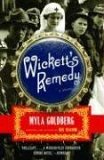Summary | Excerpt | Reading Guide | Reviews | Beyond the Book | Readalikes | Genres & Themes | Author Bio

A Novel
by Myla GoldbergOn D Street there was no need for alarm clocks: the drays, ever punctual, were an
army storming the gates of sleep. The wooden wagons were heavy and
low-riding with loud rattling wheels, their broad planks too battered
and begrimed to recall distant origins as trees. Each dray was pulled by
horses--two, four, or sometimes six per wagon--pounding down nearby
Third Street. Windows rattled and floors shook; the sound was a giant
hand shaking Lydia Kilkenny 's sleeping shoulders. Each morning she
did not awaken to the sound, but inside it. The sound of the drays came
no matter what the season. In winter it came when the sky was still
dark, the pounding hooves sharp reports against the frozen cobblestones.
In summer, perhaps because the sky was already pale with light, the
sound of the horses seemed kinder.
She knew the clattering wagons were bound for Boston proper, but the
vague tangle of streets that lay across the Broadway bridge surfaced in
her mind with the sound of the horses and resubmerged with its
diminishment. As the flow of drays subsided--the wagons no longer
traveling two across but single file--pounding hooves gave way to the
creak of floorboards and the muffled voices of neighbors. Factory
whistles blew. Church bells rang. The vegetable man made his way down D
Street shouting, "Fresh tomatoes," even if there were no tomatoes,
because those words distinguished him from the other vegetable men who
plied their carts through Southie.
As Lydia stirred, her mother put up water for cocoa and oatmeal. By the
time Lydia had the little ones dressed, Michael and their father had
finished their morning ablutions and the washbasin was hers alone. By
the time she had brushed and pinned her hair, the drays were gone.
Indeterminate Boston had once again been vanquished by the certainty of
Southie.
South Boston belonged to Lydia as profoundly and wordlessly as her
thimble finger. Her knowledge of its streets was more complete than any
atlas, her mental maps reflecting changes that occurred from season to
season, day to day, and hour to hour. Each time she left 28 D
Street--one among a row of identical triple-decker houses, the tenements
lining the street like so many stained teeth--her route reflected this
internal almanac. If on a Tuesday afternoon her mother wanted flour and
jam from Hennessy's, she would avoid the more direct route along Fifth
Street due to her dislike of the soap grease man and his fleshy block of
laundry soap. No matter what the errand, Third Street was best avoided
in early evening when the flood tide of drays returning to their stables
rendered it both dangerous and rank.
In deep winter, when ice and hard-packed snow made walking treacherous,
West Broadway was the place to catch a ride on the tailboard of a snow
dray delivering milk, groceries, or beer, but sledding was best saved
for Dorchester Heights. If a good enough sled could be found, and if the
streets were not too crowded, it was possible to start at G Street and
traverse almost a quarter of the alphabet--all the way to L Street.
Whether because he was luckier or a year older, Michael was the superior
sledder; at her best Lydia could only make J Street before her sled or
her resolve gave out.
Because Dan Kilkenny was an iceman, the whole D Street gang was in
thrall to Lydia and Michael in summer. In the thick of that season there
were few things more magical than ice--the blocks that emerged,
impossibly, from the back of the wagon, steaming not with heat but with
cold, the unmistakable stomp of the iceman conquering the stairwell,
gleaming blocks of ice piled on his broad back like enormous melting
diamonds. Contrary to Father O'Brian's Sunday descriptions of a
place streaming with light and angel song Lydia was certain Heaven
resembled the interior of her father's ice wagon: a dark place, cool
and quiet. There the salt hay, sawdust, and straw effaced the airborne
tang of leather and glue from the nearby shoe factory and muted the call
of the ragman.
Excerpted from Wickett's Remedy by Myla Goldberg Copyright © 2005 by Myla Goldberg. Excerpted by permission of Doubleday, a division of Random House, Inc. All rights reserved. No part of this excerpt may be reproduced or reprinted without permission in writing from the publisher.
Your guide toexceptional books
BookBrowse seeks out and recommends the best in contemporary fiction and nonfiction—books that not only engage and entertain but also deepen our understanding of ourselves and the world around us.